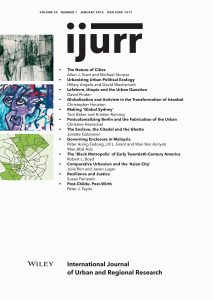What roles can utopia play in contemporary critical urban studies? The concept has often been treated warily, sidelined or dismissed. Recent years, however, have seen a revival of interest, as writers, activists and artists have sought openings to urban worlds that are different and better. By returning to aspects of the urban thought and practice of Henri Lefebvre in the 1960s and early 1970s, this article challenges common understandings of utopia and clarifies some of its potential uses for critical urban studies today. It explores Lefebvre’s emphasis on the possible, and in particular the importance he attached to extending and realizing the possible through struggling for what seems impossible. Rather than being a free-floating or endlessly open project, however, this engagement with the ‘possible-impossible’ emerged in critical dialogue with other currents of utopian urbanism, including prospective thought then influential in France. It was also rooted in long-standing concerns with the critique of everyday life and with experimentation through projects with urbanists, architects and others. By attending to these often neglected aspects of Lefebvre’s utopianism, a series of provocations emerge for addressing the urban question in ways that take seriously not only what urbanization processes and urban life are but also what they could become and how they might be constituted differently.
Details
Written by:
David Pinder
Digital Object Identifier (DOI)
10.1111/1468-2427.12083
About DOI
Read full article as PDF
Read full article as HTML
See the references for this article

